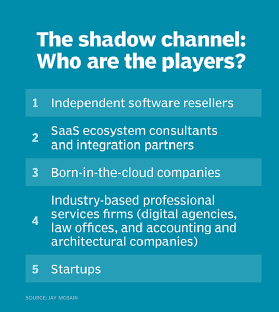What is an ISV (independent software vendor)?
An ISV (independent software vendor) makes and sells software products that work with computer hardware, operating systems (OSes) or software platforms made by another company.
An ISV's products are often sold and licensed separately from the underlying programs. They can be offered as perpetual licenses, limited-term licenses or even fully managed software as a service (SaaS).
ISVs typically provide software in conjunction with the hardware, software or cloud platform provider as a package or from an official app store. In the case of hardware, an ISV producer builds software to run on a particular vendor's hardware platform and the OSes the platform supports. An ISV may also incorporate software from a software platform provider into its offering by embedding database technology from Microsoft or Oracle, for example.
As the cloud computing model has grown more pervasive, ISVs have increasingly targeted the cloud as a vehicle for delivering software by offering products on a SaaS basis. With this delivery method, an ISV may sell its software through a public cloud or cloud marketplace. Examples include Amazon Web Services (AWS) Marketplace, Microsoft Azure Marketplace and Salesforce AppExchange.
Additionally, an independent software maker may provide the software in the form of virtual appliances that run on virtual machines or containers.
Typically, ISVs focus on a single market segment. Some have a general or horizontal focus with a broad market appeal, such as customer relationship management or enterprise resource planning.
Others target companies with a vertical market orientation -- an independent software producer targeting discrete manufacturing companies. There are also many ISVs providing highly specialized niche offerings, such as data migration utilities or plugins for specialized industry software.
Official ISV programs
Companies that make the platforms, such as Apple, AWS, Hewlett Packard Enterprise (HPE), IBM, Microsoft, Oracle, Salesforce and others, are the original equipment manufacturers. The OEM often encourages and lends support to ISVs, sometimes through the use of ISV programs. In general, the more applications that run on a platform, the more value it offers to customers. Platform manufacturers, such as IBM and Microsoft, also make applications, but they don't have the resources or, in many cases, the special knowledge required to make applications for every conceivable vertical market or niche requirement. ISVs can fill the gaps in the services provided by the larger product offering.

An ISV program generally offers a mix of technical and marketing support for a software maker. Specific benefits may include technology training, briefings on product development roadmaps, ISV-specific pricing and licensing terms, product discounts and comarketing initiatives. A platform provider may also offer ISV partners a seal of approval using software validation programs.
At times, an ISV program may operate within a platform vendor's umbrella business partner program. Such programs aim to cover a spectrum of partner relationships and interactions.
What is the difference between ISVs and other providers?
ISVs make and sell software that is added to platforms. They create software that is used by another platform. OEMs make computer hardware that software made by an ISV runs on.
Some OEMs bundle software from an ISV into their product. For example, Dell or HPE might make a server as an OEM, and Microsoft is the ISV to them to provide the Windows OS. Interestingly, another ISV, such as Adobe, might make software for Microsoft, itself an ISV, showing the complex web of dependencies that can occur among vendors and products.
Value-added resellers incorporate platform software into software product packages. They add additional training and configuration support. Systems integrators go one step further. They might take products from several OEMs and ISVs and combine them into a single system sold as a unit. Managed service providers (MSPs) remotely monitor and manage hardware and software platforms installed at the customer's location and may also keep tabs on the public cloud platforms a customer uses.
Blurring lines: Software products in the channel
One development in the ISV space is the convergence of the independent service provider business model with other IT channel business models, such as managed services and cloud consulting services.
As the MSP and cloud services markets become more crowded and competitive, companies are looking for new ways to differentiate their services. Some companies have turned to software development as a way to stand out from rivals. An MSP or cloud consultant that creates its own intellectual property is less likely to become commoditized than a company that offers readily duplicated services, such as server management, or one that resells the same public cloud service that many other companies can supply.
On the other hand, software development calls for skills that may be difficult for a channel partner to acquire and maintain.
ISVs and traditional channel partners
A vendor's channel partner base has traditionally comprised resellers of hardware, software and services. However, with the more recent growth of new channel business types, such as ISVs, the makeup of the IT channel is in flux. High-profile vendors are increasingly looking to incorporate more ISVs and other nontraditional partners into their channel strategies.
According to Jay McBain, chief analyst at Canalys, this emergent shadow channel includes ISVs, anything-as-a-service consultants, industry-based professional services firms and born-in-the-cloud companies.
The number of ISV businesses has seen significant growth. In 2018, McBain noted approximately 100,000 ISVs in play worldwide, compared to the roughly 10,000 ISV partners doing business in 2008. He forecasted that number would reach 1 million by 2027, fueled by the ability of ISVs to provide highly customized software to their clients. Mordor Intelligence, a marketing intelligence firm, estimated that the ISV market is at $2.35 billion in 2025 and predicted it to grow to $5.5 billion by 2030.
ISVs for AI
ISVs can take advantage of the rise of generative AI and large language models. These forms of AI are powerful but are often quite siloed and limited in what they can accomplish; they require additional software to interact with outside resources and data.
An ISV might provide a plugin or a software package that integrates another commercial AI application to expand its capabilities. For example, an ISV might make software that plugs a chatbot into a website's customer chat feature or makes a connector for a vision recognition software and a warehouse management platform.
Discover key factors to consider when crafting a SaaS security policy. Look into attributes that focus on effective SaaS strategy, such as visibility, user experience and workflow, for enhanced protection.






